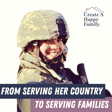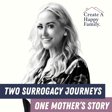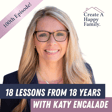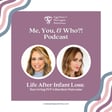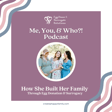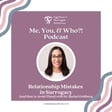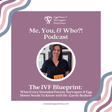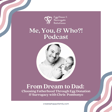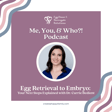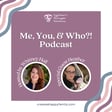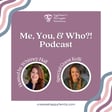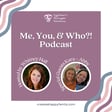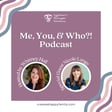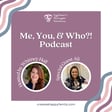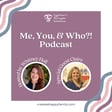Introduction to Surrogacy Challenges
00:00:00
Speaker
Hi everyone, and welcome to our special National Infertility Awareness Week series. Infertility impacts one in six people, yet the journey to parenthood through surrogacy remains financially and emotionally challenging for so many.
00:00:16
Speaker
That's why I'm thrilled I got to speak with Zach French, co-founder and CEO of the Surrogacy Foundation. Zach and his wife Alexandra are on a mission to make surrogacy more accessible by breaking down financial barriers, advocating for ethical practices, and providing crucial education and support to intended parents.
00:00:36
Speaker
You'll get to hear Zach and Alexandra's story, discuss the costs of surrogacy, and how their nonprofit is working to create a national grant to help make family building possible for more people.
00:00:48
Speaker
Whether you're personally impacted by infertility or simply want to be a source of support, we are all in fertility, and this conversation is one of hope, clarity, and valuable insight.
Whitney Hall's Surrogacy Journey and Podcast Goals
00:01:00
Speaker
Enjoy. me you, and who? Who knew it would take more than two people to have a baby? In a world where infertility is no longer a taboo topic, this podcast will take you through all of the different aspects of surrogacy and egg donation through the lens of many who walk this journey in different ways.
00:01:22
Speaker
My name is Whitney Hall and I am a two-time surrogate now turned surrogacy coordinator for egg donor and surrogate solutions. the very agency I used when I chose to carry for two amazing families.
00:01:36
Speaker
With this podcast, it is our goal to help guide and support you as you learn about what it takes to grow a family in an alternative way, as well as hear inspiring and beautiful stories of how this path has changed lives forever. We can't wait for you to hear about just one more way happy families are created every day.
Zach's Personal Surrogacy Experience
00:01:58
Speaker
Zach, I am so excited that you are here. It is National Infertility Awareness Week, and I am just so pumped that we get to talk to you. I'm really excited to be here, too. and National Infertility Awareness Week is a a special place in both mine and my wife's heart, as we're both advocates for resolve during this time, and we know how important it is to to spread the word.
00:02:18
Speaker
Absolutely. Absolutely. So for those who don't know, National Infertility Awareness Week is really just all about, exactly like you said, it's just advocating for policies to improve fertility care, care bringing awareness to infertility. um And one of my first thoughts when it comes to you know a surrogacy journey, a lot of times whenever people are thinking about you know just all of that, um you know you kind of look at the baby pictures and you think about the emotional side of things and you know just all of that. But then you kind of get into the nitty gritty and you're like,
00:02:55
Speaker
Whoa, just the expense of it. So before we, you know, just get started, can you maybe go back to, you kind of already made mention to it a little bit, but why is this, you know, just so near and dear to your heart, just as far as advocating for um infertility, surrogacy, egg donation, just the
Foundation's Mission and Fundraising Efforts
00:03:16
Speaker
Of course, of course. So my wife and I have our own fertility journey. We were very fortunate early on that we were able to conceive naturally for my older son, who's now seven.
00:03:28
Speaker
But in 2019, we were kind of rocked with some news that my wife had breast cancer. And while it's not a guarantee, the doctor did suggest that we preserve our fertility in order to make sure that we could grow our family or have the option to grow our family after she was done with treatment.
00:03:47
Speaker
And that's amazing just right there that a doctor would even like think ahead to that. It's surprising how- It's surprisingly uncommon. yeah I hear is quotes as high as 50% of oncologists don't force their patients to at least consider preserving their fertility before they start treatment.
00:04:07
Speaker
And you can always talk to her and she'll tell you, we have three weeks. And her surgical oncologist said, I've got you appointments at here, here, and here. Your husband's going here. You're going there. You're going to get this done. Then we're going start treatment.
00:04:19
Speaker
And we're going to go. Wow. And so we were very fortunate. Logistically, everything was handled. That was the last thing on our mind, by the way. We just wanted to do cancer. Of course is. And so we went on that journey and we were fortunate that treatment went well after about six or 12 rounds, actually, I think, of chemo, double mastectomy and over 30 rounds of radiation and continuous infusions.
00:04:44
Speaker
ah She's now cancer free. Love that. But the big thought is that we had to use alternative family building to grow our family.
00:04:55
Speaker
And we didn't know anything about it. And we didn't know anything about infertility other than a few friends we knew that had gone through IVF and maybe gotten a grant around it. But there was nothing around third party for sure.
00:05:06
Speaker
And so when we were done with that journey, we reached out to the one friend we knew that had used surrogacy because we knew that had to be our only route to grow our family genetically. And we we reached out to the ah agency they used in Atlanta and it was a great meeting and we ended up having a very successful surrogacy journey afterwards.
00:05:27
Speaker
But all this stuff is like so much to take in. It's such an expensive process. And that kind of led us to this new stage of our life where we decided that we wanted to start a nonprofit in the space to help increase access to surrogacy.
00:05:42
Speaker
Yeah. Well, I think you really hit the nail on the head as far as, okay, you've just, your world's just been rocked. Your wife is getting this diagnosis. You are, i mean, so much happens anytime there's, you know, you hear the big C word of cancer, right?
00:05:56
Speaker
And exactly to your point, the fact that your doctor went ahead and made those plans for you. And then even then, after all of those appointments, like you had the 12 rounds of chemo, you had the radiation, we had a double mastectomy. Like that isn't even like, okay, great. I had those appointments by not even thinking about that.
00:06:14
Speaker
And then to your point, now, whenever you guys are thinking about family building, you don't even know where to go and how to get started. And then once you get started, it's just wonderful.
00:06:25
Speaker
overwhelm for sure, just with information. and then yes, the expense of it, it is, it's an expensive, it's an expensive process for sure. There's, I mean, there's no way to get around that at this, at this point, but it is an expensive process. And I love the fact that you and your wife have, you know, just taken that and run with it.
00:06:45
Speaker
So with that, tell us a little bit more about the surrogacy, the surrogacy foundation and just what inspired you to take that further. Absolutely. So um we went and met with a wonderful agency and a wonderful agency owner and Len Goldman.
00:07:04
Speaker
But even with that caring person helping us, I always tell people it was like walking through a wind tunnel. because you're so surprised at everything that they tell you. And there's so much uncertainty because pregnancy is complicated.
00:07:17
Speaker
Yeah. Right. Things can go wrong. And so there's uncertainty as to whether you will succeed. There's uncertainty as to whether you'll be able to afford it and how much it will cost. And so when we were fortunate enough to complete our journey and have our beautiful baby girl Addison 2021, we started thinking, how can we give back?
00:07:37
Speaker
It's been ah very big part of our lives. Culturally, we are Jewish. And ever since we grew up, both of us were involved with nonprofits, constantly trying to give back. Never run one, never started one, really. sure But we wanted to advocate.
00:07:52
Speaker
And we knew that breast cancer, fortunately, is a very supported area in that space. yeah But when we looked around for surrogacy, there was almost nothing. And there was not a single organization that offered grants that covered the full cost of surrogacy for anyone.
00:08:09
Speaker
And so we said, okay, maybe this is where we need to go. And I remember it was like a eureka moment for Alex. She's like, babe, babe. She taps me on the shoulder and she's like, you must understand this is our opportunity. And I'm like, okay.
00:08:24
Speaker
All right. And like, like most happy marriages, happy wife, happy life. And we started to pursue it. And it was it was true. There just wasn't there wasn't availability around support in the space, widespread. And so we started it with a very simple goal, which is we're going to find a way to raise $100,000 and partner with ah professionals in the industry and offer a grant for the full cost of surrogacy that anybody can apply to.
00:08:54
Speaker
Yeah. I want to emphasize that, like the full cost of it, because it isn't just... It isn't, it's more than just what you see about, you know, just paying for, paying to have a surrogate, paying for her compensation.
00:09:09
Speaker
There's everything else around it. There's all of the medications. There's the attorneys. There, you know, just all, there's so many different parts. And so that idea of a full coverage is amazing. Yeah. Yeah. And it's like,
00:09:21
Speaker
And even then we had to kind of reel ourselves in because base costs, as we call them, all the stuff that you have to pay for to complete a journey are different than the variable costs, which is the different things that can go wrong or instances that can come up that cause that cost to rise.
00:09:38
Speaker
And so as we were thinking about raising the money, we were also thinking about how do we determine who a winner of this grant is, right? Mm-hmm. And so we tackle one problem at a time, as you often do, especially because we both had careers and this was done the side. And we did what people commonly do at nonprofits. call up all your friends and family.
00:09:58
Speaker
Who wants to help us out here? Yeah. Right. And were like, we're going to host a fundraiser in like three months and we're going to raise $100,000. And luckily our friends and family were like,
00:10:09
Speaker
that doesn't seem achievable. me What about in a year? And we're like, okay, that sounds a lot better. love the people that give us a reality check for sure.
00:10:20
Speaker
Exactly. That's what they're there for. and And so we did that. We we we decided that since we were, so before we had kids, we were really good at throwing parties. And so we were like, let's just throw like a really awesome party. Cause most people don't know what surrogacy is, but most people know us.
00:10:36
Speaker
And we have a big network of friends. And so if we show them a really good time and tell them our story, we felt like that was an opportunity that to like resonate with them and they would give back. And so we threw this party and we came up with this idea that it was the anti-gala gala, that we didn't want it to be stuffy and boring with tables. We wanted it to be open with dance floors and partying and everything like that.
00:10:58
Speaker
And it worked. We were very fortunate. We had almost 300 people show up to the event. Oh my gosh. in our first year and like 99 them were had no idea what surrogacy was wow But they knew us and they believed in us.
00:11:13
Speaker
And that was just such a testament to how lucky we were to have that kind of network and village around us.
Grant Distribution and Committee Selection
00:11:21
Speaker
And it was funny. i always tell the story about three months before our first event, Alex got invited to speak at Seeds, what which for the the listeners is the ethics organization around surrogacy and egg donation.
00:11:35
Speaker
And we didn't know what to expect. but We had our own journey and then we had the one people we talked to and we go this thing and it turns out there's this huge community of people that have been fighting this fight for 20 years trying to make surrogacy more accessible and ethical and everything like that. And so again, we went through the wind tunnel, but in the best way possible.
00:11:55
Speaker
And we started to build our network, but apparently there are a lot of people that have our idea, but don't follow through. And so most of the people we met were like, bless your heart, as we say in the South.
00:12:07
Speaker
I'm sure you're going to do it. And so they actually, i didn't get to network a ton in that sense. But when we raised the money, I went back to those same people and I said, hey, by the way, we just raised six figures.
00:12:18
Speaker
We're ready to give it away. And all of a sudden the the kind of floodgates opened up with to us. Thank you for your blessing. Thank you. And it was just like, whoa, like this is going to be great. we've got But there's a reason that an organization like this didn't exist before. And it's not because it wasn't needed.
00:12:36
Speaker
It's because it's hard. It's really hard to, one, have a successful surrogacy journey without grants or anything like that, right? Sure. and it's it So now you add in the grant aspect in how much you need these people to be successful and how long it takes to show the actual results of that grant.
00:12:54
Speaker
And so we started to think a lot about when we were talking to those people, how do we mitigate the risk of this not going well as much as possible? And like, what are the kind of questions we should ask? And like, what are the kind of people we should look for?
00:13:07
Speaker
And that's when we started to uncover like exactly how we should judge this and how we could keep it objective. And we assembled a review committee with medical and finance professionals and all that. Yeah.
00:13:20
Speaker
I mean, it is, it's a huge, it's a huge undertaking. It really is. Cause like you said, it's, you know, you have this great, amazing idea. Tap, tap, tap on the shoulder. Listen, you get so excited. Okay. In three months we're having this amazing party.
00:13:32
Speaker
And then whenever you start getting into the nitty gritty of it, I mean, it is, you just keep uncovering stone after stone after stone of what do what about this? What about this? What about this? I love that. How, so whenever you were talking about, um, you know, a committee for review and mitigating risk that is in reference to applicants.
00:13:53
Speaker
Right. Right. So we raised the money in February of 2023. three And then we immediately had to think about how are we going to review these grants? What are the applications going to look like?
00:14:07
Speaker
And so we were were fortunate. We kind of went around to different organizations that supported fertility and kind of assembled an application. We started talking to professionals in the space about like what we should be included.
00:14:19
Speaker
We knew there had to be reproductive endocrinologists or fertility doctors for short. on this committee. And we brought in four. We were fortunate. We have four different clinics in Atlanta with a representative from each one.
00:14:30
Speaker
And we brought in our agency owner and attorney, Len Goldman, our mental health professional, Lauren Berman. And we had this meeting. We're like, here's what we're thinking. Here's the application. and the first thing that came up in that meeting was, well, what about the financial aspect?
00:14:44
Speaker
Right. Which is kind of counterintuitive considering you're giving away money. But we actually realized that we needed CPAs and financial professionals on the on a committee to review these applicants financials, because it wasn't just unfortunately finding the person who was in the worst position financially. You actually had to find someone who could cover those variable costs if they were to come up because we couldn't.
00:15:10
Speaker
right and so we were covering all these base costs and so like after that first meeting i went out and i found a few cpas uh through my network and we assembled the financial review committee as well yeah yeah yeah so that was and for the listener like whenever you're talking about those variable costs and we've we've kind of already alluded to it a little bit the you know base costs and variable costs there's the base costs of like okay we know there's going to be medication we know there's surrogate compensation but then What if there's an emergency and her, you know, insurance has just started over again? Well, now you have an out-of-pocket cost.
00:15:46
Speaker
Or, you know, maybe her insurance doesn't work anymore and now you've got to go get an ACA policy. Or, you know, just whatever kind of that's what you're referencing to with variable costs. Yeah. So like when I think about the base costs, I think about agency legal, medical costs, the cost of the surrogate.
00:16:03
Speaker
And there that trickles down. There's actual medical like doctor costs and there's mental health professional costs yeah um that are related to that. And like those are the things you have to pay for if you want to complete a surrogacy journey.
00:16:15
Speaker
When we talk about variables, it's things like insurance exclusions, like you said. It's things that can go wrong, like if they put get put on bed rest and they have to get paid lost wages. That can back up, especially over a long period of time.
00:16:28
Speaker
Twins or C-sections. There's all these little things that can add up to an additional $50,000 to $100,000 that a person could have to pay. And so when we were analyzing people's financial status, what we realized before we opened the grant application is that we needed to understand what that sweet spot was. And guess what? None of us are CPAs.
00:16:47
Speaker
so And so we wanted it to bring those people on board that would be able to answer those questions.
Zach's Commitment and National Expansion Plans
00:16:53
Speaker
Yeah, for sure. Well, I really, mean, again, I really love the fact that you, you know, just your foundation is and i mean, and you know, from your own personal standpoint, I love that the crew that you originally assembled were thinking ahead to all of that, because I think it's so easy, you know, from a surrogate perspective, you're kind of are like, oh, it's this.
00:17:14
Speaker
And you have kind of um, im Minimal view of cost, right? Like just a lot of times you'll have kind of that minimal view of, well, it's it's this much.
00:17:26
Speaker
But exactly like you said, there are all of those variable factors that do add up that as a serviette you might not necessarily see or you kind of think about, but it's like out in the ether and you don't really have like a full understanding of what those costs look like.
00:17:40
Speaker
But, but yeah, it can be, I mean, it it can be an additional, like you said, up to a hundred thousand dollars on top of what they're already, you know, supposed to pay that those base payments. So yeah, that, that makes total, that makes total sense.
00:17:52
Speaker
So, okay. I know you referenced, um, it was Atlanta that, or Atlanta, Georgia, um, where it was your grant, um, was It was just for people in Atlanta or in Georgia, correct? Yeah, Georgia residents, yeah.
00:18:08
Speaker
Okay, okay. And you just recently, I say recently, but you did eventually award your first couple.
00:18:20
Speaker
Right. And so let me take you through that story. Tell me. Right when we were going through this process of trying to make sure that we created a fair, objective process of of reviewing these applicants, um I met with a a guy named Adam Winder who runs Seed Trust Escrow, which is like- Yes, we have had Adam on the pod. Oh, nice. Yeah. Yeah.
00:18:43
Speaker
Yeah. So one thing led to another. we had a great conversation and then he found out about my background as a salesperson and technology and entrepreneur and an attorney. And he's like, can I hire you?
00:18:57
Speaker
thank you Yeah. And so like, again, serendipitously, when I ended up going and running their legal and sales team, I was in the middle of all these different parties and financials and all this type of stuff that escrow sees that maybe not everybody sees, let alone the surrogate. Right.
00:19:15
Speaker
And so I started to really understand it. I started to really grow my network. inside of the surrogacy professionals. um And eventually ended up being the MC for the seeds conference that November. And everybody was like, Oh my gosh, this is amazing. And in our second soiree in 2024, we saw an increase from like maybe five or 10 people in the industry to like 20 or 30 people in the industry coming in to support us at this event.
00:19:44
Speaker
And we were fortunate. We raised another $110,000 in profit, $220,000 total, which was a huge jump from the first year. And at the same time, all these people are like pulling it out of us. Like, how can we take this national?
00:20:00
Speaker
And the big part, as you can tell how much I've spent talking about how we were reviewing the grant process was let's make sure we're doing this right. Right. And so our second grant we launched in 2024, we kept limited to to Georgia residents.
00:20:13
Speaker
um And we awarded that grant to our second grant recipients in October of 2024, who actually just recently matched with their surrogate. Pretty awesome.
00:20:24
Speaker
Oh, sending all the baby dust.
00:20:29
Speaker
It's a very magical, lots of different people involved, not just us, right, that make these things happen. And by that, I mean the village, right? The people that show up to these events, the agencies that provide pro bono services, the MHPs that provide pro bono services, the lawyers that provide pro bono services, the discounts that clinics offer, right, to make this possible.
00:20:50
Speaker
But We also we got better that year, right? We created rubrics. We improved the application process. We built it out in a software company that's a sister company of Seed Trust called Orchid. They built it out for free for us in there so that we could track exactly where people were in the application and offer help and understand where people were dropping off.
00:21:12
Speaker
And there was all these different insights that we could use to improve it. And then at like as as the as the second soiree was closing, I got this crazy idea of like, maybe it's time for somebody to run this organization full time, especially if we're going to go national.
00:21:27
Speaker
And I actually ended up leaving my very, very, very good job with with Adam over at Seed Trust and all the wonderful people there to run this organization full time with the mission of taking it national.
00:21:39
Speaker
So now I've been on that mission for the past year. Oh my gosh. Amazing. Just amazing. Yes. So, and correcting me correct me if I'm wrong, but at this time, there isn't a national grant. They're usually just state, or if there is a national grant, it's like very small.
00:21:57
Speaker
Yeah, there's some smaller grants from other organizations that help people out. There's also full grants for same-sex male couples through men having babies, but there's not a full grant for anyone still nationally, right?
00:22:09
Speaker
um And I think, you know, look, if I um um tend to move fast and break things, as as you might hear that moment, and I'm like telling my board, I'm like, let's just do it this year. And they're like, let's slow it down. Let's figure this out.
00:22:23
Speaker
yeah And then also at that time, very fortunate to have ah my best friend and cousin who is a brand strategist come to me and say, look, Zach, I've got some time now.
00:22:35
Speaker
i want to offer you $80,000 services pro bono to help you create a memorable, meaningful brand and strategy for your foundations.
00:22:47
Speaker
And we went through this process and I tell you, it is it's fun. Cause you really dig into your why, right? Like they send you these send these questions and he interviews you. Then we talk about like, where do you see yourself in one year? What's your dream headline? Where's your public publication? Who says what? What do your donors say? What do your grantees say? What are you saying in this article?
00:23:08
Speaker
And they do the same thing for 10 years from now. Like trying to see like, what's your ultimate goal here? And for that 10 years, we were like, Alex and I are sitting on Capitol Hill and we're advocating for regulation in this space and mandated insurance coverage to help people access this.
00:23:24
Speaker
And the only way we get there is by building a lot of the experience and data that's necessary to show how big this need is and how unachievable it is for so many people.
00:23:36
Speaker
And so we went through that process. and And at the same time, we were like, you know, At that time, our name was Gift of Surrogacy Foundation, and it was exactly what we were doing with the grants. But we felt like if we were going to be the surrogacy foundation for the entire country, maybe that was the name that we needed to have. Yeah, sure.
00:23:57
Speaker
I love that. Well, and like you said, I mean, love that you make reference to it because it isn't just, Hey, let's throw a party. Let's raise money. And then, um, you know, let's, let's call it a day. And I shouldn't say let's call it a day.
00:24:10
Speaker
Like we've already established, like there's a whole lot that is involved in this, but I love the fact that you're taking it beyond and it, it is you going to Capitol Hill and it is you spreading awareness, which is one of the things that resolved and national infertility week is all about of spreading awareness of,
00:24:25
Speaker
This isn't just, you know, something that pops up randomly in People magazine or, you know, you know a friend of a friend. So many more people are struggling with infertility than you are even aware of and don't have access or anything.
00:24:40
Speaker
have the inability don't have the ability to have a grant or, you know, it I mean, gosh, just like you said, the insurance aspect alone, i it's so minimal. you I mean, it's gotten so much better. I feel like over the last four or five years of insurance actually covering certain things, but it's a lot.
00:24:59
Speaker
It's a lot. It is a lot of, of things. And, The thing that we we were honed in on when we were going through this brand strategy session was we didn't want to be the classic FUD nonprofit that focused on how hard it was and all the negatives and everything like that.
00:25:18
Speaker
I always like to reference like the Sarah McLachlan commercial where there's a fly landing on someone's eye. And you have mute it and then the puppies and it's, yeah, I know. we We felt that was for yesterday's nonprofit.
00:25:32
Speaker
And one of the things we came up with was like, one, we wanted a positive spin. And two, we didn't want to be your grandparents' nonprofit because there were so many problems with those nonprofits. There was a lack of transparency of knowing where money was going and not really resonating with the cause.
00:25:47
Speaker
Right. yeah And so like, how do you build that strong connection? And we landed on something beautiful, which is that we wanted to focus on the magic of surrogacy. that through all this complexity, through all this hard work, even before the surrogacy process, resulted in giving someone the gift of family, right?
00:26:06
Speaker
And how did what role could we play in that? I'll tell you, we could be not your grandparents' nonprofit. We could focus on transparency, on bringing in a new generation of donors.
00:26:17
Speaker
But then we also had to be someone's contemporary guide, right? Because right now, as people go to search for information, it is overwhelming. Right. And the only people that are providing information are the people that you have to work with.
00:26:30
Speaker
And a lot of those people are providing really good information like egg donor and surrogate solutions. But who's right? Because you may go to two different places and get two different like pieces of information. And also, at least for like a lot of heterosexual couples,
00:26:43
Speaker
They go through a lot of trauma to get to this point, and it's hard to talk to a human. So how could we cater to that? how What did that mean for us? And what we came up with was that surrogacy stuck in this past state.
00:26:55
Speaker
We need to take it to a future state. And the way we're going to do that is by taking it mainstream, by making it talked about as much as IVF is now. Yeah. And thinking about it about like IVF was about 10, 15 years ago when nobody really talked about it. That's where surrogacy is now.
00:27:11
Speaker
So can we be that organization that assembles some sort of strategy that allows surrogacy to be considered when people are just thinking about family building? Yes.
00:27:22
Speaker
And like making that information accessible, but also making consistent information available. Right. Right. And so that's what we are trying to build right now outside of
Advocacy and Changing Perceptions of Surrogacy
00:27:33
Speaker
grants. And we continue to grow the grant space is like, how can we educate and support people earlier on in their journeys so that when they get to professionals like egg donor and surrogate solutions or other agencies or lawyers or what have you, they've already got a good base set of knowledge.
00:27:47
Speaker
Because the one of the number one reasons that people don't pursue surrogacy is because they're overwhelmed. Right. Absolutely. And just lack of and lack of education. And I think, you know, to your point, almost that that negative spin, I think, like, for lack of a better phrase, but yes, that negative spin. I used to I used to say, you know, my mission.
00:28:10
Speaker
let me rephrase. One of the things that I love so much, you know, just as a former surrogate, I love that I, I mean, my best moments were seeing mom and dad become mom and dad, right? Like, I mean, that was that was my why.
00:28:26
Speaker
And it was amazing and it was beautiful and that should be celebrated. And even using the phrase like alternative family building, I'm like, take out the alternative. This is just a different, this is just part, this is family building. That's what it is. Whether you're, you know, if you're a heterosexual couple and, you know, you're going about it in the quote typical way, like it should just be considered family building. And this is just one other path.
00:28:48
Speaker
And I feel like exactly to your point, I love the way that you've said that of, bringing more awareness to it and taking out the you know Sarah McLachlan vibes of it all. And the stigma, right?
00:29:00
Speaker
There's a huge stigma around surrogacy. Like even just today on LinkedIn, on one of our posts, I get a comment that it's like sex trafficking or child trafficking. And I'm like, are you kidding me? Like, did you watch the video of these people that just want to grow their family for the past 10 years?
00:29:16
Speaker
And this is their only option, yeah right? But we we don't do ourselves any favors in this industry. There is a lot of fraud in the industry too. And that's the stuff that makes the news.
00:29:27
Speaker
We have to change the narrative. We've got to change the narrative to show all of the amazing magic that happens as a result of the surrogacy journey. And also that will help bring awareness to the point where we can start to prevent things like fraud happening and start to bring regulation into the space and make it a space where people feel safe Because it's simply, like you said, another option for family building.
00:29:51
Speaker
Yes. No, I completely agree, which is why things like seeds ethics is so important. And, you know, one of the biggest things that i fortunately or unfortunately, right, people are all over Facebook and social media and, you know, some people are doing independent matches and things like that. But that can only take, I mean, there's there's so many
00:30:12
Speaker
In an industry or in a situation that isn't always guaranteed, why would you add any more stress and scary when and and not... choose your people based off of, like you said, those ethical standards and having those professionals around you. And I always refer people. I'm like, if you're looking at agencies, go look at Seeds Ethics, like at least like start there, just start there.
00:30:35
Speaker
Like that at least is a good base point of, to your point, education and not necessarily feeling overwhelmed. Cause yeah, if you Google surrogacy, it goes nuts. Yeah. And you can end up in those Facebook groups. And the loudest people in those Facebook groups are not the best people to listen to.
00:30:51
Speaker
Right. They're the people that have had some experience that they're trying to explain to everybody is terrible and all that kind of stuff. Whereas like so a lot of the people that have gone through this journey that have experienced that magic and are now holding a baby or multiple babies in their arms, like they're not in those groups.
00:31:09
Speaker
Right. Like they're not the ones that are like, oh, my gosh, it's amazing. dah-dadadadada And so, like, how do we bridge the gap? How do we take it from this stigma, misunderstood to accepted?
00:31:20
Speaker
Right. And celebrated. That's what's really important. And that is exactly what we're trying to do through our many different channels and through our many different partners and our wonderful supporter supporters and village. Yeah. I mean, yeah, clearly the Surrogacy Foundation is clearly not just a grant. Like, I mean, it's like, it's all encompassing. And I just, I mean, i hear your passion and it just makes me excited.
00:31:42
Speaker
Um, and, and yes, it should be celebrated. I mean, my goodness, I went through half a box of tissues whenever I was on your website and listening to the beautiful story of the couple that just, you know, received their grant and,
00:31:57
Speaker
got matched and you know just all of those things i mean it is it's so beautiful and and it should be celebrated and i love that you and your wife are paying it forward in this way i okay you mentioned um and i and you guys i think you said it in your intro video that's on your website you mentioned you're jewish and there's a word that you guys use right for um sadaka yes okay say it again sadaka Sadaka.
00:32:24
Speaker
Yeah. What does that mean? So like at the most fundamental level, like my kids, what they know is that they put money in a piggy bank and it goes to charity. Right. But like, it really means like righteousness.
00:32:35
Speaker
Right. And like righteousness through giving back and understanding that, While it's really important and you absolutely should prioritize your nuclear family, you're part of a tribe.
00:32:47
Speaker
You're part of a bigger community and you need to do what you can to help those who can't help themselves. Right. And so like that has like fueled our fire to make this happen.
00:32:59
Speaker
One, because it resonates, right? Obviously through our experience, but two, because we feel like it's our duty to do something like that. And when our kids come to our events, like my my son has come for for two years now to these events and having him on stage and holding him and letting him see all these people that are coming out to support us, there's no greater feeling in the world because he asked me, when am I going to be able to run the Surrogacy Foundation?
00:33:24
Speaker
Right. It's beautiful. Oh, it's absolutely beautiful. it Oh my gosh. It's amazing. So what for, you know, some, I feel like there's almost, and maybe this isn't fair, but I think in my experience, when i talk to intended parents, you have some intended parents who they are traumatized for lack of a better phrase or you know they just they've gone through so much just to hold that baby in their arms and they almost want to like okay I did it I need to close this chapter I just want to I just want to be done and to your point focus on just that nuclear family and that is beautiful and that is perfect and that makes so much sense
00:34:08
Speaker
And then you have this, you know, you sometimes have another type of intended parent who is, to your point, like, I want to, like, I just had this amazing thing happen. I want to tell more people about that.
00:34:20
Speaker
For both sets, I don't want to, like, make it bilateral, but, you know, just for that spectrum, you know, let's say, what would you maybe, what are maybe some ways that other intended parents could pay it forward for,
00:34:38
Speaker
in this space within what makes sense to them, within their comfort level. I mean, i I think it's like, I hate to sound super simple here, but like, just tell your story publicly, right?
00:34:51
Speaker
don't think that's simple. I don't think that's simple. I think that's beautiful. It's like, you know, there it is okay to consider this a very hard thing and to not want to publicize it.
00:35:03
Speaker
But just know that if you're willing to take that extra step, even if it's word of mouth, it doesn't have to be social media, right? yeah Word of mouth telling people and normalizing the journey Right. And just being like, hey, that's how I grew my family.
00:35:16
Speaker
Right. and And look at this beautiful baby I have here. Right. And like like we would not have had this opportunity but for surrogacy. Right. Is like that's that's huge.
00:35:27
Speaker
But we also have to focus on how are we going to help the people that don't want to do that. Right. And like one of the big things that that we're building right now is this technology assisted kind of digital companion for surrogacy.
00:35:43
Speaker
Or if you want to get simple, a chat bot, right? and And like, I think when i've I've talked to a lot of intended parents, you've probably talked to 10 times as many as me. Like they, their, their number one thing they say to me is they give me a deep breath. I go, thank God I could talk to somebody that understands what I'm going through.
00:36:03
Speaker
Yeah. And it takes so long to get to that point to talk to the human. And so when we were thinking about how can we have a scalable impact on parents, regardless of whether they want to be donors or they want to tell their stories or anything like that.
00:36:18
Speaker
How can we provide support and education to the other group, which by the way, is the overwhelming majority and that's okay. Right. We're like, how would it feel if you were in bed at midnight and you're worried, maybe you've had one failed IVF transfer. Maybe you're going through cancer treatments, what have you about how you're going to build your family. And you go down the deep, dark hole of of Facebook message boards and things like that. Oh gosh. And you're not ready to talk to a human and you're like, oh double edged.
00:36:45
Speaker
Right? Right. And I'm like, well, what if we became that trusted companion that you could go to our website and you could simply have a conversation with someone or something that's not going to judge you.
00:36:57
Speaker
It doesn't matter what time of day it is. It doesn't matter what questions you ask. It's going to tell you, hey, here's the list of information that we have. And it's been curated by these people. And listen, this is what we're not going to talk to you about when you should go talk to a human.
00:37:12
Speaker
Right. That's this grand vision. And it all starts with one thing, which is people don't know where to go to get financial education or support in the space because there's no list that gets updated continuously. So our first step is simply creating a database where people can tell us, hey, I'm from this area. I'm at this stage of my journey. I've suffered with these medical conditions.
00:37:39
Speaker
Who can I talk to? and then being able to provide them verified information, right? yeah it says these organizations are available to you. And then committing ourselves to constantly updating that information and then growing into the education piece where you can ask, what is the legal process around surrogacy?
00:37:57
Speaker
What are these surrogates asking for? How should I treat them? What kind of autonomy should I give them? All these hard questions that nobody thinks about until they're in a journey. We wanna be able to provide some context.
00:38:08
Speaker
And then hopefully when they get to the point where they feel really comfortable, they can start to reach out to the professionals and they already know to an extent what to expect. And the thick number one thing is all of the no's that even your agency and every single professional is having to tell people now turn into yeses because people are more prepared to do it.
00:38:31
Speaker
Yeah. No, I love that. That's beautiful because I think you're so right. We're, I mean, for better for worse, we're in a day and age where we are relying so much on, you know, just Dr. Google, I, you know, I call it and those Facebook message
Digital Support and Addressing Infertility Rates
00:38:45
Speaker
boards and things like that. And it is, I mean, but to your point,
00:38:49
Speaker
It's 2 a.m. You're freaking out. It's not like you can call up, you know, your're your bestie. And even your bestie doesn't necessarily know what you're going through. And so just to have that little bridge of, you know, technology to kind of, if anything, just get you started.
00:39:03
Speaker
And like you said, get you comfortable. So then the questions that you do end up asking those professionals are like your personal curated, like to me, how does this relate to my journey? Not just a journey in general, but my journey.
00:39:18
Speaker
Exactly, exactly. And that's why, like, while we're building this thing, and we're like, we're going through like this major campaign around, how do we provide unfiltered information the like the social media world so that they can know they're not alone?
00:39:35
Speaker
Right. And where that has blossomed is like our current grantees and surrogate are actually like interviewing people. They're doing reverse interviews of professionals in the space to ask those tough questions, those burning questions that they've had early on that they haven't been able to get answered.
00:39:52
Speaker
And hopefully people start to see those stories. And then they also see them going through the journey. Right. They see stage one, they see stage two, and it's broken down in a way. And we've got like these seven stages, which are obviously a a little bit of ah oversimplification, but a way that it's actually digestible and they can see, my gosh, their journey from like just fertility treatment was like a year and a half.
00:40:16
Speaker
yeah that Mine's okay. I've been doing this for six months and I'm feeling pretty good about this. Or, you know, when I was selecting an agency, I didn't even think to ask them those questions. So when I'm going and I'm going through the agency selection, that's what I'm thinking about.
00:40:28
Speaker
Or when I'm matching with a surrogate, what are the kind of questions that are okay to ask? What kind of relationship should we have? What's the balance of understanding that they should be compensated because of all the sacrifice they're making versus the altruistic side and the relationship we're going to have after this and so on. They don't necessarily, they they can't do that now. It's done on the fly.
00:40:48
Speaker
And so we want to be that place they can go to for that stuff and just understand they're not alone. Yeah, for sure. and I mean, I feel like at egg donor and surrogate solutions, i think we do an amazing job in the education process for both intended parents and surrogate. And we do ask those questions and guide individuals through all of those parts.
00:41:09
Speaker
But to your point, just to even find us can be so overwhelming. And so to have you guys as kind of the, the compass for to get you here, there, and everywhere is beautiful.
00:41:23
Speaker
What, and you probably have already, you've kind of already alluded to it, you know, with with just the dreaming that you guys are already doing and all of the processes, but what would you say is maybe the ultimate hope for the Surrogacy Foundation in the next five years?
00:41:40
Speaker
I'm hoping that through offering grants and building a reputation within the community, and starting to truly understand who are and who intended parents are and who surrogates are, that we want to increase access to surrogacy.
00:41:57
Speaker
Now, it sounds simple, right? But there's a reason that it's so important to address right now and why we've got to start right now so that in five years we can get to that grand vision. Number one, infertility rates are skyrocketing, right? We see every single year a new report is released and we went from one in eight to one in six to one in five and who knows, maybe it's one in four next time.
00:42:19
Speaker
And all of the reasons are starting to increase too. So you're seeing a rise in cancer rate amongst young people every single year for the past 20 years, right?
00:42:30
Speaker
You're seeing a lot of LGBTQ folks that want to grow their family and they should be able to, right? And then there's also a cultural aspect. which is that more people are waiting to have kids because they want to advance their career further. They want to be able to provide better lives for their kids.
00:42:45
Speaker
And guess what happens at 35? You're called geriatric, right? It is the most offensive. I mean, oh my gosh, medical. Can we not get a better word?
00:42:56
Speaker
good yeah just like, excuse me, at 35, no one is handing me a cane. Can we not? Right. Right. And it's like, but there's a reason, right? That's not the best word.
00:43:10
Speaker
But at 35, I can't be an egg donor. once fine you No Right. And so it's like all these things are not getting better and there's no shade at the people that are waiting to have kids. I totally empathize with that. I look around my neighborhood and I see every single parent in my neighborhood is at least four years older than me and has kids my age or younger.
00:43:31
Speaker
Right. And I'm 38. Just for reference here. Like, I'm not young, but I'm like one of the youngest parents in my neighborhood. And so like, if we play. Like kids are expensive. So people are waiting longer because like, hi, no one can afford daycare at this point. Like, i mean, yeah.
00:43:46
Speaker
Daycare is sometimes $15,000, $20,000, $25,000 a year. I can. Like private school, right? And so it's like really hard to think about like, how am I going to do that? So you have this reason, this tipping point that's happening, which is that we need to start now.
00:44:01
Speaker
The other thing and that we've talked a lot about is the financial barriers. When I went through surrogacy in 2021, paid to complete my journey and almost nothing went wrong Right. Almost nothing. we had to have a C-section and the middle. We had some insurance that we had to purchase. But for the most part, we were there right now.
00:44:20
Speaker
We can't even, we're not 100% confident that $100,000 plus all these free services and discounts is going to cover the cost because it's gone from 120 to 150 minimum and oftentimes way more than that.
00:44:32
Speaker
And so we have to think about like, what is it that's going to help us with these financial barriers? And so we think about our grants, but we think about our grants as like notches on an application.
00:44:43
Speaker
to start to build like, hey, look, proof, all these people can't afford it. Look how many people applied for our grants. Look how many people we had to say no to. Look how much money we have to provide to these people to complete this journey.
00:44:54
Speaker
sit Then there's that idea of education that we've spoken a lot about. And so like, how do you overcome this like big, complicated process that's overwhelming for people? You provide them education earlier and then you have to think about the stigma.
00:45:07
Speaker
And like, how do I overcome that stigma and make it more accepted? And that's simply by talking about it more and getting people who have been talking about it to talk about it more. And what's the end result? What's the answer to your question?
00:45:19
Speaker
Let's imagine a world where everybody who wants to build their family can actually do so. that That's the end goal. And there's a lot of steps to get there. But if we have succeeded, that is the mindset that we want to have for anybody
Celebrating Surrogacy and Community Involvement
00:45:33
Speaker
growing their family.
00:45:33
Speaker
Yeah. I mean, that's the dream. and the Oh, I love that. That it's beautiful. What, if you could give any advice just from, from one intended parent to another, or even from, you know, the CEO founder of the Surrogacy Foundation, what advice would you give to an intended parent who is maybe just starting on this path?
00:46:03
Speaker
I would say celebrate the journey over the destination. Right. It sounds counterintuitive because the baby is what you want at the end of the day, and that's what you're fighting for. But every single step of the way, there are people out there to support you. There are organizations like ours that will help you get through that. There are people who have gone through what you've gone through.
00:46:24
Speaker
Right. And I know everybody has a unique story. But you need to understand that like you can reach out and you can see these people and you can see it happen and just appreciate every single little win across the way.
00:46:37
Speaker
The first one may be having a successful egg retrieval. The second one may be having you know genetically tested eupoid embryos right that are going to high chance of taking eggs. the second The third thing may be finding that that agency that you work with or that surrogate that you vibe with, right?
00:46:53
Speaker
Every single step, make sure you celebrate that journey because there's going to be bumps in the road. It's not going to be a straight up into the right journey. As you'll see, when you look at different things in our on our website and things, it's a winding path.
00:47:07
Speaker
It's up and down and everything like that. Yes. Celebrating every single one of those moments. And I think One of the things that I also love that you, I just, I hear your passion and it sounds like almost a, um, just a base, a key to the surrogacy foundation is that aspect of community because infertility can feel so lonely, especially whenever to your point, people aren't sharing their story. And so you don't maybe know that your neighbor friend, you just, you
00:47:40
Speaker
ah some acquaintance somewhere is also struggling or had struggled. And the fact that like community makes it community, just, it makes you feel less lonely in something that is so hard.
00:47:52
Speaker
And I love that idea of, being able to reach out and start there and finding that person who can make, you know, be excited and understand whenever you say, i had a successful egg retrieval or our genetic testing came back and it was great. Or, you know, just be having somebody as part of that community, celebrating those little wins instead of looking at, you know, maybe your mom or your dad or your sister or your brother and them being like, okay, but what does that mean? I don't understand.
00:48:22
Speaker
exactly It's like, ah what we always sum it up as like building a village, right? A village of experts and supporters, whether that's people who have been through it or professionals or our organization that's there. yeah And the way that we tell people that we're going to do that is we say, we bring the village to you, right? Like that's our goal. It's like,
00:48:43
Speaker
How do we bring this to you so that you don't have to go off and spend countless anxiety-stricken hours searching for it? You know this is the place to go because at the end of the day, it's the community that gets you through these tough moments. It's the village that's there to support you.
00:49:00
Speaker
And ultimately, that's who you need to pay it forward with afterwards is like, how can I help become part of someone else's village that it was in that spot that I was in? That's beautiful.
00:49:11
Speaker
So for our listeners, if you want to go and find out more about the Surrogacy Foundation, where do they go? I go to thesurrogacyfoundation.org. ah We have a beautiful new website with our beautiful new brand. Talks about this this kind of like the way that we're thinking about it.
00:49:28
Speaker
And we're hoping that if we tell people exactly what we're doing, if we celebrate the journey, and we' there's no secret to this, by the way, like nonprofits don't work without donors, right? And so we want to create an organization that not only makes donors do good, but we want them to feel good about what they're doing.
00:49:48
Speaker
One of the most provocative statements that ah that my cousin came up with during this is trading dollars for dopamine. I love it, actually. No, that's amazing. Right.
00:49:59
Speaker
And like, and that's what we want. We want you to be connected, whether you've been through it, haven't been through it, you're professional serving in the space. We want you to be connected to these different parts in the journey so that it's not just putting your money into a black box.
00:50:12
Speaker
We want you to understand that. We want you to be able to choose, oh, this is what resonated with me. Right. And then we try to pull back this idea of transparency even further, which is that we're going to start to attribute where every single dollar goes.
00:50:27
Speaker
We want you to know that right now we're in growth mode. So not every dollar is going to grants, right? We are trying to raise money for grants, but we know that we have to increase our reach. So we're spending on things like developing the chatbot, right? yeah And all these different aspects and we're not hiding it.
00:50:44
Speaker
The other thing is like a lot of people hide their grant process. but Like you definitely should not hide your grant process. So if you go through and you want to learn anything about that, reach out to us.
00:50:54
Speaker
I'll sit on a call with you and explain it to you. There's an easy contact us button on the website. It's very obvious. And maybe you're not ready to talk to a human yet, right? And the chatbot isn't released.
00:51:07
Speaker
The thing that I can tell you is go follow like at the Surrogacy Foundation on Instagram and Facebook and go follow at magic of surrogacy underscore TSF. That's actually a new account that we've just created in collaboration with our grantees. And we're going to be highlighting every single step of their journey and what got them to that point so that you can see that you're not alone in this.
00:51:30
Speaker
And you can see the raw, unfiltered moments that led to this point in their journey, which, by the way, isn't the destination. We can celebrate that journey along the Yeah. Oh, that's beautiful.
00:51:41
Speaker
So if you, are you guys taking applications right now or what is the, tell me more, where are we at? Yeah, So ah the next grant application that we open should be this summer. It's going to be our national grant application, but as one can imagine, ah there's a lot of steps before going from Georgia to national. To national. Yeah, right now what we're doing is we're assembling a group of professionals that's going to expand our review committee.
00:52:08
Speaker
We're making sure that they understand what's required of them in order to review these applications. But when we do open the application, there'll be a 90 day period. Right? So you'll have some time to fill out the application.
00:52:20
Speaker
Like I said, it's built out in this software so that it's super easy to use and you can reach out to us if you need support along the way. And then once that period closes, our review period in our two years has been 30 to 60 days. And so you'll actually have a decision within six months from the date of opening the application to the time that we decide who our winner is.
00:52:41
Speaker
um And so you'll have that opportunity to do that hopefully before before a year ends, but we want to make sure we do it right. Oh, for sure. For sure. I love that. No, that's amazing. Well, Zach, I really do just appreciate your time. and I mean, your passion is just contagious. And i love everything that the Surrogacy Foundation is doing. And I am just so grateful that you and your wife had this aha tap on the shoulder moment.
00:53:10
Speaker
And I love just all of the change and celebrating that you are doing in this space that we all hold so near and dear To our heart, I have one last question for you.
00:53:24
Speaker
And it's a fun one um for anyone. And I know you've seen me sipping on my coffee um this
Conclusion and Community Engagement
00:53:30
Speaker
whole time. on Me and coffee, you have a very codependent relationship on each other. And so I always like to ask the question, what filled your cup today?
00:53:41
Speaker
Literally or figuratively, what has been the thing that has filled your cup today? Well, I would say figuratively going to yoga this morning fills my cup. Nice.
00:53:52
Speaker
I am a recent yogi over the past six months. I go five to six times a week now and it has changed my life. Yeah. In the best way possible. It just, the the mindset, um the breath work, everything about it has just changed my energy and the people that I've connected with throughout this space. But I also filled my cup with a cold brew this morning after yoga.
00:54:15
Speaker
Love it. Yes, absolutely. No, that's good. That's mind, body, soul right there. That's all I heard. Yeah. I love it. Good balance. Good balance. That's amazing. Well, Zach, thank you so, so much. And um all of those links and everything are going to be on our show notes.
00:54:30
Speaker
So um listeners go and check out the Surrogacy Foundation. Yeah. And can I say thank you, Whitney? What you're doing is a huge part of taking surrogacy mainstream, creating these real conversations with people where you talk about the nitty gritty around surrogacy is actually what makes it okay to pursue it.
00:54:50
Speaker
And also like shout out to your boss, Katie, she's an amazing human. She ah the the the The help that she's provided, everything that she has done to help our organization and to help surrogacy proliferate through her board position on seeds and everything like that, it' just it's it's all helping further this mission of accessible surrogacy. So you're very, very lucky. We're also very, very lucky to have you as a podcast host because you're freaking awesome.
00:55:18
Speaker
Oh, thank you. And I can't wait to to listen to all your episodes because it's it's so helpful. Oh, thank you so much, Zach. I really appreciate it.
00:55:28
Speaker
Thank you so much for joining us on this episode of Me, You, and Who. We appreciate your time and hope you enjoyed our discussion today. As we wrap, we would like to remind you of some of the ways that you can stay connected with us and be part of the me, you and who podcast community.
00:55:46
Speaker
Firstly, if you haven't already, make sure to subscribe to our podcast on your favorite platform. Hit that subscribe button so you never miss an episode and can stay up to date with our latest content.
00:55:58
Speaker
But that's not all. We also have an exciting YouTube channel where we share some bonus content behind the scenes glimpses and video versions of our episodes. Head over to YouTube and hit that subscribe button there as well. And don't forget to click the notification bell so you'll be the first to know when the new episodes go live and for more exclusive updates, engaging discussions, and a chance to connect with fellow listeners.
00:56:23
Speaker
Be sure to follow us on our social media accounts. You can find us on Instagram, Facebook, and TikTok at Create a Happy Family. If you're interested in finding out more about creating a happy family, please visit us at www.createahappyfamily.com.
00:56:39
Speaker
Thank you again for being part of the Me, You & Who community. Your support means the world to us. I can't wait for you to join us next time as we continue to share stories and journeys of creating happy families.

